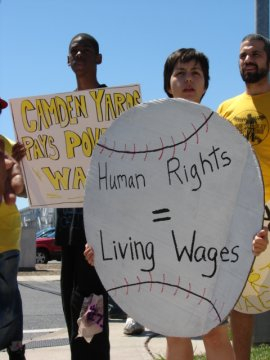Baltimore Stadium Cleaners Organized by Workers Center Join AFSCME

Tanya Diggins, a cleaner at the Baltimore Orioles baseball stadium, considers herself lucky. After four years on the job, she knows she’s going to have work cleaning up after fans. That’s not the case for many cleaners at Camden Yards, who are hired by a subcontractor and gather around the stadium on game days, hoping to get in and get to work.
Diggins is on the leadership committee of United Workers, a multiracial workers center that’s fought for higher wages for the cleaners. “When we started organizing, workers started at $4.50 an hour and the only demand we thought possible was to fight for a living wage,” said communications staffer Tom Kertes. United Workers won that demand—$11.30 an hour—in September 2007.
But after hitting that home run, workers returned this season only to discover that many could not find stable work.
To ensure cleaners get regular schedules—and address the indignities and inconsistencies of working for rapidly changing subcontractors—the United Workers voted in July to join the American Federation of State, County and Municipal Employees (AFSCME). But the decision wasn’t automatic.
GOING UNION
The feisty workers center considered many options: a “community benefits agreement” (which would spell out working conditions but not include a grievance procedure); an independent union created by United Workers themselves; taking over the cleaning contracts as a worker-run cooperative; and joining an existing union.
Ultimately, they settled on unionization to cement their gains.
Organizers said unionization would give members a legally recognized method of bargaining for and grieving changes at the stadium, and that a union at Camden Yards would be one more organizing chip in United Workers’ favor in its work elsewhere.
United Workers won the $11.30 wage last fall through an agreement with the Maryland Stadium Authority, which imposes the wage on the subcontractor that wins the stadium’s cleaning contract. But the living wage didn’t prevent the newest contractor, Chimes DC, from committing other offenses. Workers complained that Chimes not only failed to guarantee regular work but shorted their checks and treated them disrespectfully.
In addition, constant turnover of contractors made for chaotic work.
Diggins said Chimes is the fourth company she’s worked for at Camden Yards, but some things never changed. “They said it won’t be run like a temp agency, but it still is,” Diggins said.
LONG-TERM RELATIONSHIP

SUPPORT LABOR NOTES
BECOME A MONTHLY DONOR
Give $10 a month or more and get our "Fight the Boss, Build the Union" T-shirt.
United Workers and AFSCME formed a relationship years before the worker center contemplated unionization, smoothing the often rocky road of union and community organization partnership. Organized labor sometimes regards temporary laborers and immigrant workers as competition—cheap labor—although bosses, not vulnerable workers, are responsible for setting wages low.
But AFSCME was involved in key fights that helped pave the way to the living-wage victory, and stayed involved. The union was part of a coalition that won a living wage for Baltimore city workers back in 1994.
“AFSCME had been working with us since 2005,” Kertes said. “They had been pressured to not work with us, but still did. AFSCME already demonstrated they could work with United Workers in a way that respected our role with the workers.”
AFSCME represents 30,000 state employees in Maryland, and their experience with outsourcing in the public sector tied in well with the difficulties faced by cleaners at the stadium.
BEYOND SERVICING
Many workers centers fear a partnership with a union will lead to bureaucratized relationships, both with members and with employers.
United Workers looked for a union that would go beyond a service model, and allow UW to stay involved with workers, raising consciousness about what it means to organize on the job.
“We were clear about two things: dual membership and complementary roles, explained Kertes. “Our role is to work with individual workers in leadership development, and we’ll help people at the stadium navigate working and being in a union.”
AFSCME agreed to the terms, and now that the union is official, its leaders have asked for a meeting with Chimes.
Both the union and UW think they can learn much from each other.
“The way United Workers mobilized themselves and the community should serve as a textbook study for labor,” said AFSCME spokesman Joe Lawrence.
